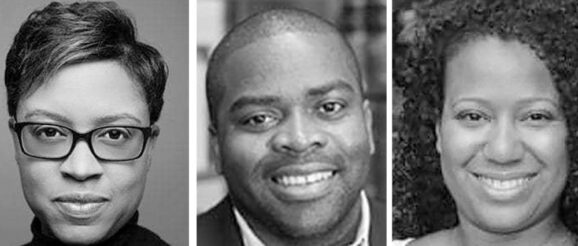Black Voice News Receives $300,000 from GNI Innovation Challenge

“One thing to note about the conversation about mutation, everyone tends to be frightened by that … those things tend to plant these concepts of what happens in nature that could lead to negative outcomes, but this is a situation when it comes to virality, that science, mutation is part of what is expected where that process is concerned. Because of the profile of COVID-19, people are understandably concerned. But our agency is watching this intently.”
The interview with Dr. Hall primarily centered on the CDC’s tips for celebrating virtually with loved ones and offering guidance to those who choose to enjoy the holidays with friends and family outside of their homes.
By Stacy M. Brown, NNPA Newswire Senior National Correspondent
@StacyBrownMedia
The lack of a quiet place to work and resources like internet service often hamstrings students of color’s ability to adequately learn during the pandemic, according to education experts who share their frustration about the inequities in education faced by minorities and those in underserved communities.
“There also may be familial responsibilities like caring for a younger sibling or parent,” said Adrienne Oddi, the dean of admissions and financial aid at Trinity College in Hartford, Conn.
“Homes and residential dwellings are often more congested with family, making it difficult to focus. We see these demands in our own students at Trinity, too,” Oddi further asserted.
“It is a problem that isn’t simply at the K-12 levels but also in higher education. One of the main reasons we welcomed our students back to campus in the fall was to help combat inequity issues that may exist in a student’s home. We were able to help provide our students with the resources and space they needed to focus on their education.”
Oddi acknowledged that the task is not easy for every student who wants an education.
“Assuming students can prioritize themselves and their education is the admissions officer’s equivalent of ‘Put your mask on first before assisting others,’” he illustrated.
“It’s a luxury that not every student and family can afford. “But the onus is not on the student. It is on everyone. As the dean of admissions and financial aid, the onus is on me, too.”
Oddi demanded that those in higher education need to examine their practices and ask themselves – “Who is here? Who is missing?”
“We need to be able to work toward equitable education for all, leveling the playing field for those most at risk of being left behind, and close the gap that data shows are widening during the pandemic. We need to work toward helping now, and helping always,” he said.
José Viana, former director of the U.S. Department of Education’s office of English-language acquisition and Senior Education Advisor at Lexia Learning, told NNPA Newswire that current circumstances caused by the pandemic have resulted in English language learners – many of whom are students of color – being at a significant disadvantage.
“For example, opportunities for oral language typically developed through speaking are infrequent due to the lack of in-person instruction,” Viana remarked.
“In addition, many school districts continue to modify educational plans due to ever-changing state mandates, causing emergent bilingual students to be left out – either due to missing essential discourse opportunities with peers and teachers in the classroom or lacking the assistance and technology needed to learn effectively through remote instruction.”
He continued:
“It is also important to consider that home and school relationships are a cornerstone of working with emergent bilingual students, and that school districts across the nation often lack interpreters that reach the family members of students while distance learning.”
Thanks to the Bill and Melinda Gates Foundation’s continued partnership, the National Newspaper Publishers Association (NNPA) has carried on a public awareness program to close the public school and the higher education achievement gap.
NNPA President and CEO, Dr. Benjamin F. Chavis Jr., has conducted videotaped interviews with education experts, community activists, and college students to help determine whether students in underserved communities have their needs met during the pandemic.
During the interviews, Dr. Chavis discussed the various challenges students of color and the working-class face as the pandemic continues to grip America and place a stranglehold on education.
The NNPA also continued publishing a series of articles to draw attention to America’s education gap.
“I’m a tutor, and elementary school speech-language pathologist, and I work with students of color where I see various challenges for some of my students,” offered Jessica Bonner-Gomez, founder, owner, and tutor with For Other Prizes Consulting.
“The biggest challenge is the inability to get online at a set meeting time during the week,” Bonner-Gomez stated.
“For the children who attend their online speech therapy sessions inconsistently, the barrier is that the parent is a night-shift worker and sleeps during the day, has to rely on daycare staff to get the child online if the parent works throughout the day, or cannot remember to get the child online dure to already tending to other children and responsibilities.”
Bonner-Gomez said children who perform noticeably better at school and around their peers are more likely to turn off when they are only learning virtually.
“As some of these children are already behind and may be aware of it, they tend to be the least attentive,” Bonner-Gomez noted.
“Consequently, this lack of attention puts them ever further behind their peers. This reality is exacerbated when some parents are too exhausted to provide one-to-one assistance to their child or find they cannot grasp the school content to be of help. Further, parents may not have the funds to hire a tutor even if they know their child is noticeably behind.”
